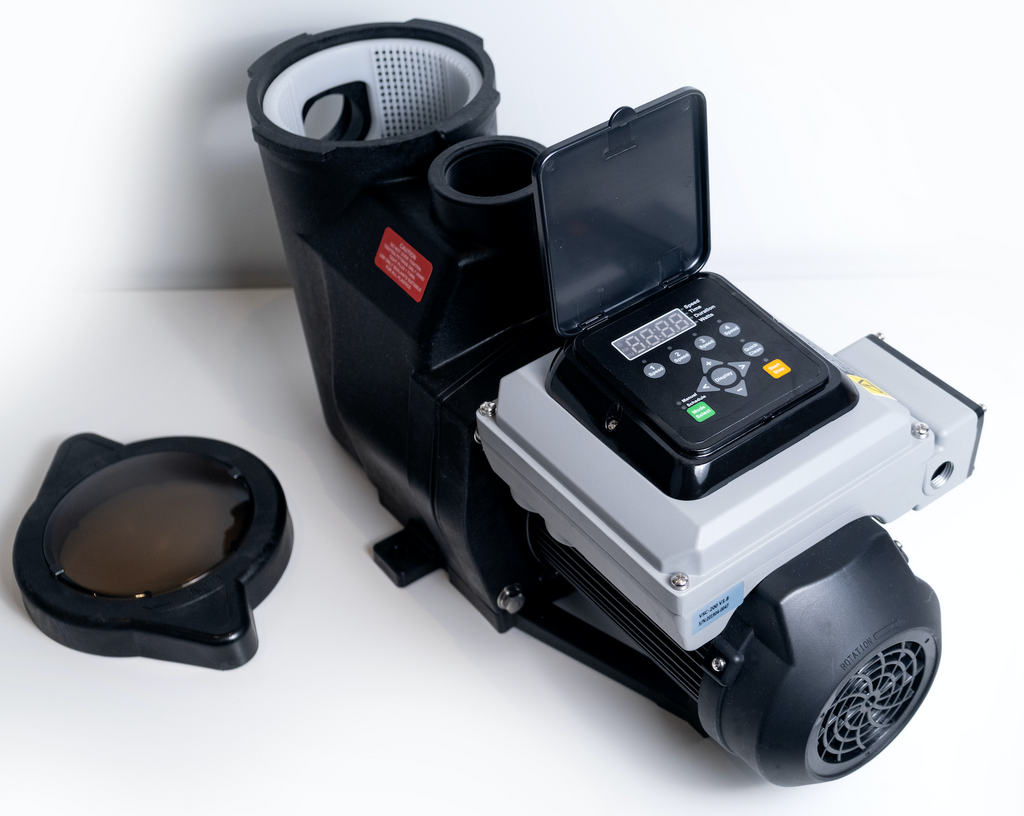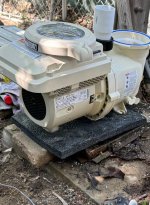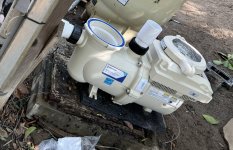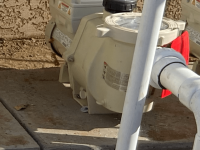Questionable New Pump Installation
- Thread starter jayjayaz
- Start date
You are using an out of date browser. It may not display this or other websites correctly.
You should upgrade or use an alternative browser.
You should upgrade or use an alternative browser.
- Jul 21, 2013
- 54,424
- Pool Size
- 35000
- Surface
- Plaster
- Chlorine
- Salt Water Generator
- SWG Type
- Pentair Intellichlor IC-60
I would not want a pump balanced on a piece of foam that is further balanced on some rocks.
Whose responsibility is it to provide a stable surface for the pump? Was it within the local companies scope of work to redo your equipment pad? Who should have cleaned up your equipment pad of the debris so the installer had a good surface to install the pump?
I would remove the foam and the rocks and put the pump on the concrete pad that it looks like is under that stuff. But I do not know if that was in the installers scope of work.
Whose responsibility is it to provide a stable surface for the pump? Was it within the local companies scope of work to redo your equipment pad? Who should have cleaned up your equipment pad of the debris so the installer had a good surface to install the pump?
I would remove the foam and the rocks and put the pump on the concrete pad that it looks like is under that stuff. But I do not know if that was in the installers scope of work.
- Jan 7, 2012
- 1,586
- Pool Size
- 21000
- Surface
- Plaster
- Chlorine
- Salt Water Generator
- SWG Type
- Pentair Intellichlor IC-60
No. You want a proper base and support for the pump. If it's not too late, I'd suggest swapping the pump for the 3 HP version.A local company installed new pump on foam, is this okay?
Bill1974
Well-known member
I don't think you need a 3 hp pump for a 12K gallon pool unless you have a lot of water features or a hot tub connected to it.
A proper base for the pump to sit on is important. Concrete pavers (on a proper base) are inexpensive. I have my pump on a dense rubber paver, a foam pad is to soft and will compress over time.
A proper base for the pump to sit on is important. Concrete pavers (on a proper base) are inexpensive. I have my pump on a dense rubber paver, a foam pad is to soft and will compress over time.
- Jan 7, 2012
- 1,586
- Pool Size
- 21000
- Surface
- Plaster
- Chlorine
- Salt Water Generator
- SWG Type
- Pentair Intellichlor IC-60
A larger pump will move the same the same amount of water using less electricity. The efficiency and flexibility of a larger pump is worth the slightly higher cost.
Nasty looking base, if nothing else. I'd get all that Junk out from underneath.
Bill1974
Well-known member
The saving of a larger pump is the ability to run slower and move less water (but still enough) to filter effectively than a single speed pump. There is a minimum RPM the pumps run efficiently at, especially if it is restricted by one skimmer and one return. The energy required to move X gallon/per minute against Y restriction is a set number of watts (or joules/sec). The energy consumption difference between a 3 HP and 1.5 hp VS pump is probably minimal. Unfortunately pump mfg's don't publish data for power consumption based on flow and head. The risk with a 3 hp pump in this situation is what happens if the pump runs at full speed? It may over pressurise the pumping or downstream equipment. There is also a cavitation risk. The pump should be sized based on the plumbing limitations.A larger pump will move the same the same amount of water using less electricity. The efficiency and flexibility of a larger pump is worth the slightly higher cost.
AQUA~HOLICS
In The Industry
I can not see any reason for a 3HP pump at all. A 1.5vs matches your pool and filter and would make sense to me.
Dave,I can not "see" any reason for a 3HP pump at all...
Would you like to borrow my glasses???
Jim R.
At my age, things often go right over my head as Jim's post has done.
Is there really a valid benefit to a 3 HP pump that offsets the increased cost? I haven't looked at pump ricing in years.......is it less than 100-150?
Is there really a valid benefit to a 3 HP pump that offsets the increased cost? I haven't looked at pump ricing in years.......is it less than 100-150?
Dave,
This is one of those cases where there are many different opinions and none of them are always right or wrong..
I personally like larger VS speed pumps as you can run them slower and still move plenty of water. The slower you can run them, the less electricity they use and the quieter they are. At my normal running speed, you almost have to touch the pump to make sure it is still running.
I like to run 24/7, as I have a SWCG, and I can do that for less than $20 bucks a month. I have three 3 HP IntelliFlo pumps that have been running 24/7 for well over 10 years. They run today, just like they did when new. Everyone here will be the '2nd' to know the instant any of them fail.
Without any proof, I personally believe that the larger VS pumps are more robust than the smaller 1.5 HP pumps.
I like the fact that you can always turn up the flow on a larger pump, when needed, and this might not be the case of the smaller VS pump.
I think the point is that I 'see' VS pumps from my experience, and you 'see' VS pumps from your experience.. Does not make either one of us right or wrong, we just see things from different view points.
Thanks,
Jim R.
This is one of those cases where there are many different opinions and none of them are always right or wrong..
I personally like larger VS speed pumps as you can run them slower and still move plenty of water. The slower you can run them, the less electricity they use and the quieter they are. At my normal running speed, you almost have to touch the pump to make sure it is still running.
I like to run 24/7, as I have a SWCG, and I can do that for less than $20 bucks a month. I have three 3 HP IntelliFlo pumps that have been running 24/7 for well over 10 years. They run today, just like they did when new. Everyone here will be the '2nd' to know the instant any of them fail.
Without any proof, I personally believe that the larger VS pumps are more robust than the smaller 1.5 HP pumps.
I like the fact that you can always turn up the flow on a larger pump, when needed, and this might not be the case of the smaller VS pump.
I think the point is that I 'see' VS pumps from my experience, and you 'see' VS pumps from your experience.. Does not make either one of us right or wrong, we just see things from different view points.
Thanks,
Jim R.
I'm hijacking this thread and I'll stop but ask one more question first........what is t rough idea of the cost difference?
I also think you "benefits" are valid ones, but at what cost?
I also think you "benefits" are valid ones, but at what cost?
- Jul 21, 2013
- 54,424
- Pool Size
- 35000
- Surface
- Plaster
- Chlorine
- Salt Water Generator
- SWG Type
- Pentair Intellichlor IC-60
I also think you "benefits" are valid ones, but at what cost?
Pentair Superflo VS 1.5HP 2.2THP - $1,439
Pentair Whisperflo VST 2.6THP - $1,809
Pentair Intelliflo3 VSF 3HP (w/touchscreen) - $1,829
(wo/touchscreen) - $1,600
B+D 1.5HP Pump $989
B+D 3HP Pump $1,300

So 1.5HP -> 3HP from Pentair is $390
1.5HP -> 3HP from B+D is $311
Similar threads
- Replies
- 4
- Views
- 90
- Replies
- 10
- Views
- 100
- Replies
- 2
- Views
- 84
- Replies
- 19
- Views
- 320




